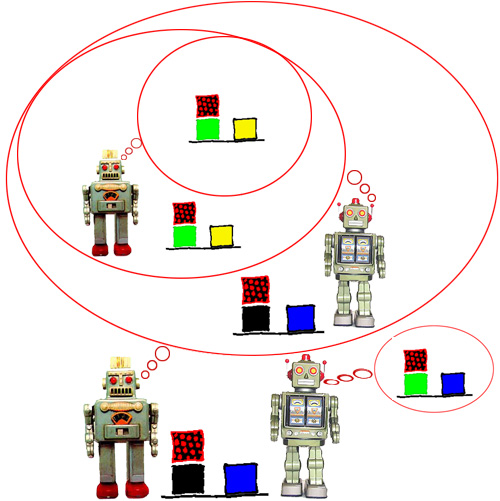Half-day workshop on AI, logic, and epistemic planning3 October 2013, Technical University of Denmark, Copenhagen, Denmark |


Affective Computing researchers deal with the automatic recognition, computational simulation, and expression of emotion in human-machine interaction. This talk briefly introduces the WASABI affect simulation architecture and our attempts to measure emotions offline and online. Then, ideas on how an agent's simulation of social behavior might benefit from dynamic epistemic logic are introduced in the hope to spur a fruitful discussion among the participants of the workshop.
Levesque introduced the notion of only-knowing to precisely capture the beliefs of a knowledge base. He also showed how only-knowing can be used to formalize non-monotonic reasoning within a monotonic logic. Despite its appeal, all attempts to extend only-knowing to the many-agent case have undesirable properties. A belief model by Halpern and Lakemeyer, for instance, appeals to proof-theoretic constructs in the semantics and needs to axiomatize validity as part of the logic. It is also not clear how to generalize their ideas to the first-order case. In this talk, I present a new account of multi-agent only-knowing which, for the first time, has a natural possible-world semantics for a quantified language with equality. An axiom system for the propositional fragment will also be discussed.
As logicians and mathematicians, we build formal representations of phenomena in the real world. These can be concrete such as a physical structure (e.g., a bridge) that we are aiming to build, or more abstract and culturally dependent such as behaviour of human beings in an election, notions of belief, knowledge, moral obligations, etc.
There are several reasons why we are doing this: as computer scientists, we know that the formal representation is a first step towards allowing computers to help us with the issues at hand and implement a representation of the phenomena in the computer in order to deal with a concrete issue such as predicting whether the designed bridge will collapse or not. But on the more fundamental level, we also think that formal representation is part of Dilthey's process of Verstehen: the conceptual analysis that is at the same time a prerequisite and an integral part of the formal representation allows us to understand what is going on.
Unfortunately, when you move away from concrete goals with clearly defined benchmarks towards Verstehen, the process of evaluation of whether the modelling was successful gets fuzzier, and you have to start to think about methodological issues involving the empirical validation which often seem to be taken for granted in more goal-driven parts of our field.
In this talk, I shall not give any answers, but examples of how difficult it is to do formal representations when the target is the understanding of something that is in our mind such as knowledge, belief, and moral judgments. This can serve as food for thought for those who want to work on epistemic planning.
Although planning for the tasks a household robot has to perform appears to be easy, there exists the problem that the robot is usually uncertain about the state of the household when starting to plan. For example, when getting the order of tidying up the kitchen, the robot does not know what objects it will have to put away and whether there are actually any objects that need to be put away. Furthermore, while sensing operations can provide moreinformation about the environment, things can go wrong when executingan action. In this paper, we try to identify conditions under which classical planning can be used in a replanning loop in order to solve the planning problem in nondeterministic partially observable open domains. In particular, we will define completeness and soundness of replanning with respect to nondeterministic planning and we will identify a PSPACE-checkable condition that guarantees soundness.